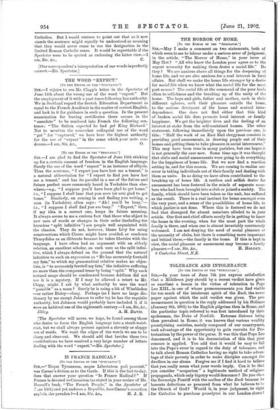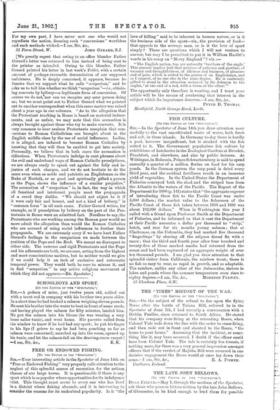TOLERANCE AND INTOLERANCE.
[TO TRH EDITOR OF THE "SPECTATOR:'J
Sin,—In your issue of June 7th you express satisfaction that a Middlesex jury should by a recent verdict have given so excellent a lesson in the virtue of toleration to Pope Leo XIII., in one of whose pronouncements you find visible far too much of the intolerant spirit of the Rock. the news- paper against which the said verdict was given. The pro- nouncement in question is the reply addressed by his Holiness (January 8th, 1901) to the English pilgrims then in Rome, and the particular topic referred to was first introduced by their spokesman, the Duke of Norfolk. Extreme distress being then prevalent in Rome, it was known that various wealthy proselytising societies, mainly composed of our countrymen, took advantage of the opportunity to gain recruits for Pro- testantism by the power of the purse. It was this that Pope Leo denounced, and it is to his denunciation of this that your censure is applied. You add that it would be easy to fall into the Pope's error, in regard to the duty of tolerance, and to talk about Roman Catholics having no right to take advan- tage of their poverty in order to make disciples amongst the dwellers in our slums. Forgive me if I find it hard to believe that you really mean what your words imply. Can it be that
you consider " souperism " a legitimate method of religious propaganda, which only bigotry would denounce ? Do you class
the Sovereign Pontiff with the scribes of the Rock because he
laments defections so procured from what he believes to be
the Ohurch of God ? Would it, in your judgment, be right . for Catholics to purchase proselytes in our London slums ?
For my own part, I have never met one who would not repudiate the notion, deeming such " conversions " worthless and such methods wicked.—I am, Sir, &c.,
[We greatly regret that owing to an office blunder Father Gerard's letter was returned to him instead of being sent to the printer as intended. Owing to this blunder, Father Gerard printed his letter in last week's Tablet, with a certain amount of perhaps excusable denunciation of our supposed unfairness. He is deeply concerned, it appears, because he fancies that we support what he calls " souperism," and he asks us to tell him whether we think "souperism"—i.e., obtain- ing converts by bribery—a legitimate form of conversion. Of course we do not, nor can we imagine any sane person doing so; but we must point out to Father Gerard what we pointed out to another correspondent when this same matter was raised about a year ago in our columns. "As to the allegation that the Protestant teaching in Rome is based on material induce- ments, and so unfair, we may note that this accusation is always brought against those who try to make converts. It is very common to hear zealous Protestants complain that con- versions to Roman Catholicism are brought about in the English middle class by the use of social influences. Ladies, it is alleged, are induced to become Roman Catholics by knowing that they will then be enabled to get into society. Personally, we believe that in both cases the accusation is ridiculous. When Protestants indulge in cant phrases about the evil and underhand ways of Roman Catholic proselytisers, we are always ready to speak out against the folly and in- justice of such charges, and we do not hesitate to do the same even when so noble and patriotic an Englishman as the Duke of Norfolk, or so good and spiritually gifted a person as the Pope, shows the influence of a similar prejudice." The accusation of " souperism" is, in fact, the way in which all fanatical and intolerant people meet the propaganda of a creed they dislike. "We should not object to it if it were only fair and honest, and not a kind of bribery," is "common form" in all such cases. Father Gerard writes, for example, as if proselytism by bribery on the part of the Pro- testants in Rome were an admitted fact. Needless to say, the Protestants who are working among the Roman poor would no more admit the allegation than would the Roman Catholics who are accused of using social influences to further their propaganda. We are extremely sorry if we have hurt Father Gerard's feelings in the comparison we made between the position of the Pope and the Rock. We meant no disrespect to either side. The extreme and rigid Protestants and the Pope and his adherents are both, we are sure, acting from the highest and most conscientious motives, but to neither would we give if we could help it an inch of exclusive and autocratic temporal power. They would both be sure to misuse it, and to find " souperism " in any active religious movement of which they did not approve.—En. Spectator.]







































 Previous page
Previous page